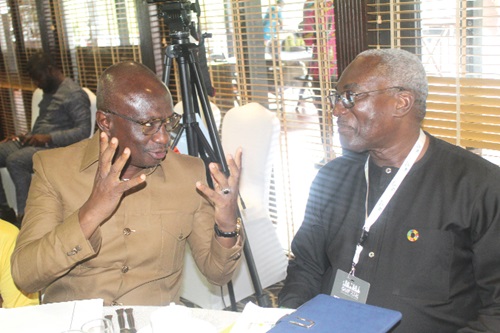Stakeholders at the Ghana Urban Forum have stressed the need to build resilient cities capable of withstanding the impact of climate change, citing the recent flooding in Accra as an example.
They observed that the rampant flooding following almost every downpour in Accra called for better urban planning to mitigate the effects of natural disasters. They, therefore, recommended that cities must prepare for future onslaughts of climate change as increased intensity of natural disasters posed a significant threat.
The stakeholders were speaking at a two-day conference organised by the Ghana Urban Forum (GUF) to address pressing urban development issues, while highlighting the critical need for meticulous planning, coordination and management of human settlements.
The conference emphasised the need for the sustainable growth of urban areas through inclusive policy debates, sustained advocacy, capacity development efforts, and the effective coordination among various stakeholders.
The event, hosted by the Ministry of Local Government, Decentralisation and Rural Development (MLGDRD), was on the theme: "Nurturing Roots, Growing Futures: Combining Policies and Partnerships for Urban Resilience and Transformation".
It aimed to align with the Sustainable Development Goal 11 (Sustainable Cities and Communities) and the New Urban Agenda (NUA). The conference brought together stakeholders such as the ministries, departments and agencies, officials of district assemblies, non-governmental organisations, civil society organisations, private sector entities, professional bodies, development practitioners, development partners, traditional authorities and the media.
This year’s forum also served as a precursor to the inaugural African Urban Forum (AUF) and the 12th Session of the World Urban Forum (WUF 12) scheduled to take place in Addis Ababa from September 4-6, 2024, and in Cairo from November 4-8, 2024.
During the conference, participants are expected to delve into a wide range of topics crucial for urban resilience and transformation, including social housing and financing options, urban economies, resilient urban infrastructure and services, Innovative Strategies for disaster prevention and management, and participatory urban governance models.
Partnership / Collaboration
The Minister of Local Government, Decentralisation, and Rural Development, Martin Adjei-Mensah Korsah, called for strong collaboration and robust policies, adding that government was committed to enhancing urban living conditions and harness the benefits of urbanisation.
He also called on Metropolitan, Municipal, and District Assemblies (MMDAs) to champion the urban development agenda within their jurisdictions. Mr Korsah emphasised the principles of inclusivity, sustainability and good governance, and urged stakeholders to prioritise sustainable urban mobility, metropolitan governance and child-friendly urban environments.
He said the country’s urbanisation trajectory post-2010 had seen several sectoral interventions, and acknowledged the challenges of intersectoral collaboration and coordination.
To address these challenges, he said, the ministry had organised this forum to foster dialogue and cooperation among critical stakeholders. In alignment with the United Nations Sustainable Development Goal 11, which aims to make cities inclusive, safe, resilient and sustainable, he said the country was committed to transformative urban policies.
He said the adoption of the New Urban Agenda would ensure that national and local governments worked towards achieving these goals. "The outcome of this forum will stimulate government and political commitment, driving effective urban planning and development," the minister said.
Structured urbanisation
The Chairperson of the National Commission for Civic Education (NCCE), Kathleen Addy, called for a structured urbanisation that would make life easier for individuals, foster community interactions and combat climate change effectively.
She said the aim of urbanisation was not to alter human behaviour but restructure living environments, while civic education targeted behavioural change, aiming to instil values and knowledge crucial for community cohesion and responsible citizenship.
She said in Ghana, urbanisation was accelerating, with the population expected to grow from the current 34.7 million to 52.2 million by 2050, and urban dwellers increasing from 57 per cent to over 70 per cent.
The rapid urbanisation, she said, presented critical challenges, therefore, highlighting the disorganised nature of Ghana’s urban expansion, often characterised by a disregard for laws and building codes.
She said the annual flooding during the rainy season served as a stark reminder of the consequences of building on watercourses and the destruction of green spaces. She said urbanisation in the country had frequently ignored essential elements for sustainable living such as transportation, waste disposal, social services and security.
She urged Ghanaians to embrace green spaces, shade trees and urban gardens to enhance quality of life and environmental sustainability.
Improved efficiency
The Practice Manager, Urban Resilience and Land Adufa West and Central of the World Bank, Madhu Raghunath, said there was the need for improved efficiency in land management to combat urban sprawl, particularly in Accra and other medium-sized cities.
She also stressed the need to address disparities in service delivery between affluent and poorer urban areas. She hailed Ghana's forthcoming national urban policy, expressing the hope that it would incorporate strategies to enhance livability and resilience in urban areas.
She, therefore, reaffirmed the Bank's commitment to support urban transport, water supply, sanitation, environmental management, social protection and private sector development.
She emphasised the importance of well-functioning, liveable cities in driving Ghana's path towards a middle-income status. The United Nations Resident Coordinator in Ghana, Charles Abani, reiterated the United Nations' commitment to supporting Ghana's urban development and called for productive partnerships and effective utilisation of urbanisation opportunities.
He underscored the urgent need for sustainable urban policies, resilience against climate change, and inclusive development to ensure no one was left behind as cities expand.
Mr Abani called for a holistic approach to urban management that integrates digital transformation and socioeconomic inclusion, while cautioning against the chaos that can thrive in unmanaged urban environments.
He said urban planning should not just focus on major cities such as Accra but also on smaller and intermediate spaces to ensure balanced and sustainable growth. He said UN's various initiatives in Ghana included the Smart Cities programme and efforts to promote sustainable building materials and resilient housing.
He highlighted the importance of local level investments and the role of cities in achieving national and global development targets.

